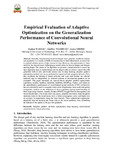| dc.description.abstract | Recently, deep learning based techniques have garnered significant interest and popularity in a variety of fields of research due to their effectiveness in search for an optimal solution given a finite amount of data. However, the optimization of these networks has become more challenging as neural networks become deeper and datasets growing larger. The choice of the algorithm to optimize a neural network is one of the most important steps in model design and training in order to obtain a model that will generalize well on new, previously unseen data. In deep learning, adaptive gradient optimization methods are mostly preferred for supervised and unsupervised tasks. First, they accelerate the training of neural networks and since mini batches are selected randomly and are independent, an unbiased estimate of the expected gradient can be computed. This paper examined six state-of-the-art adaptive gradient optimization algorithms, namely, AdaMax, AdaGrad, AdaDelta, RMSProp, Nadam, and Adam on the generalization performance of convolutional neural networks (CNN) architecture that are extensively used in computer vision tasks. Experiments were conducted giving comparative analysis on the behaviour of these algorithms during model training on three large image datasets, namely, Fashion-MNIST, Kaggle Flowers Recognition and Scene classification. The results show that Adam, Adadelta and Nadam finds the global minimum faster in the experiments, have a better convergence curve, and higher test set accuracy in experiments using the three datasets. These optimization approaches adaptively tune the learning rate based only on the recent gradients; thus, controlling the reliance of the update on the past few gradients. | en_US |

